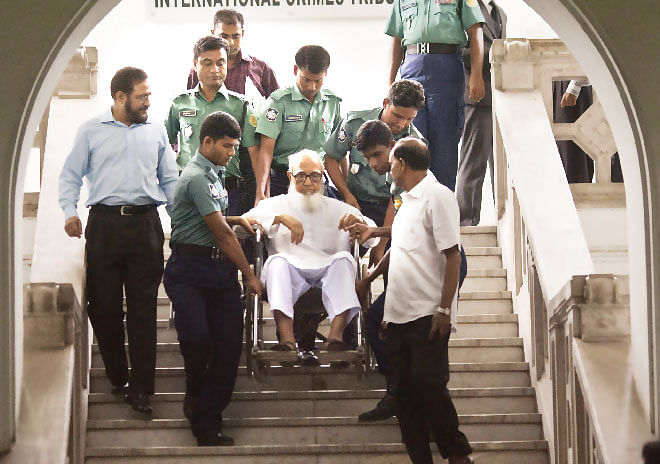Banning Jamaat
Banning Jamaat

On February 19 last year the then State Minister for Law Qamrul Islam at a rally announced: "Banning Jamaat is only a matter of time now." Over a year since then, the government has not banned Jamaat. This year, Qamrul has been promoted to the rank of full minister in the Sheikh Hasina-led new government.
When Qamrul had made the announcement, the situation was different. The Awami League-led-14 party alliance had held the rally in the capital amid the Shahbagh uprising, which was demanding the death penalty for all war criminals including Jamaat leader Abdul Quader Mollah and imposing a ban on Jamaat-e-Islami. From the rally, some senior AL leaders had supported the demands of the Shahbagh movement.
Aggrieved by a war tribunal's verdict of life imprisonment to Jamaat leader Abdul Quader Mollah, the youths took to the streets in Shahbag. They had also accused the government of negotiating with Jamaat regarding the trial of war criminals and taking political mileage before the parliamentary election. But the unprecedented agitation had upset the government's reported plans. The protest had forced the government to amend the International Crimes (Tribunals) Act, 1973 in February last year empowering the government to file appeal against the verdicts of the war tribunals.
The apex court awarded capital punishment to the Jamaat leader who was finally executed before the January 5 controversial and voter less parliamentary election through which the AL retained power for another five-year term.
The trial of war criminals, which some of the Jamaat's top leaders have been facing has not been completed. Information Minister Hasanul Haque Inu on March 26 this year however made a claim similar to that of Qamrul--" Banning Jamaat is only a matter of time now." The same day AL General Secretary and LGRD Minister Syed Ashraful Islam made some clever remarks. He said that banning Jamaat was a political decision and everyone would come to know when such decision would be made. Two days before that, Law Minister Anisul Huq said the government would take action against Jamaat after the Appellate Division disposed of the party's appeal against the High Court verdict that had declared Jamaat's registration with the Election Commission as a parliamentary political party illegal. 'We are not now taking action as the matter is pending with the court," said Anisul. However there is no move for a quick disposal of the appeal petition filed by Jamaat last year against the High Court verdict.
Amid such a situation, the activists of Gonojagoron Mancha have announced that they would continue their agitation until their demands are met. They have again alleged the government of trying to negotiate with Jamaat on the trial of war criminals. They have also strongly blasted the government for taking donation from Islami Bank, which, it seems, has annoyed the government policymakers as some of them have questioned the necessity for continuation of the Shahbag movement. The April 3 attack on activists of Gonojagoron Mancha by Bangladesh Chhattra League and Jubo League men might be a manifestation of the government's annoyance. Not only that, the Shahbag activists have also been denied the permission to hold a protest rally on April 4. Police charged truncheons on Gonojagoron Mancha activists when they gathered at Shahbagh to protest the attack.
In the view of officers of Shahbagh police station, the Gonojagoron Mancha did not take permission to hold the rally, which sounded rather ridiculous. The Gonojagoron Mancha never needed any permission when they staged demonstrations for more than two weeks in February last year occupying the Shahbagh intersections. At that time the police even had ensured some foolproof security measures.
More than a year after the Shahbagh uprising, the government has moved to hold the trial of Jamaat. The war crimes investigation agency at the end of last March handed over a 373-page report along with 2,303 pages of documents to the prosecution, recommending banning Jamaat and six organisations that were associated with it back in 1971. The investigation agency made the recommendation as they have found the involvement of these anti-liberation bodies in grievous crimes committed during the Liberation War. The prosecution is scrutinising the investigation report and will press charges against Jamaat.
While amending the International Crimes (Tribunals) Act, 1973 in February last year, the government hurriedly incorporated a provision in the law empowering the war tribunals to hold trial of organisations for crimes against humanity. But the hurried move missed one crucial point-- punishment to an organisation found guilty of committing crimes against humanity. The existing law says nothing about it. The High Court verdict, which declared Jamaat's registration with the Election Commission illegal, stressed the need for incorporating a provision in the International Crimes (Tribunals) Act, 1973, specifying punishment for an organisation guilty of committing crimes against humanity.
But the government still remains silent about this. Despite the High Court's observations, some war crimes prosecutors however have already claimed that no amendment was required to this effect. Their statements have only triggered debates and confusion. The government should have taken measures to this effect before the beginning of the trial of Jamaat.
The writer is Senior Reporter, The Daily Star.